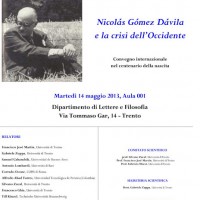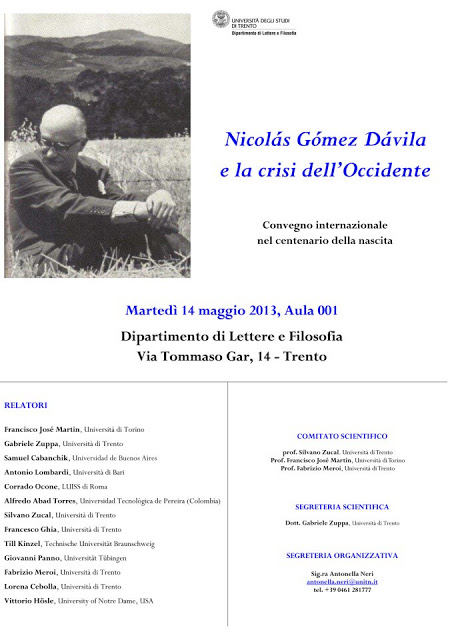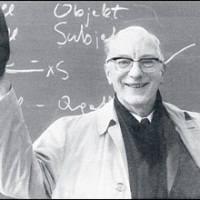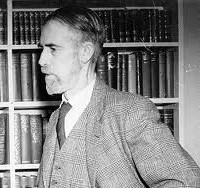Currently Browsing: Academy
Know Your Gnostics: Eric Voegelin & the Neoconservative Disease, by Gene Callahan
Eric Voegelin often is regarded as a major figure in 20th-century conservative thought—one of his concepts inspired what has been a popular catchphrase on the right for decades, “don’t immanentize the eschaton”—but he rejected ideological labels. In his youth, in Vienna, he attended the famous Mises Circle seminars, where he developed lasting friendships with figures who would be important in the revival of classical liberalism, such as F.A. Hayek, but he later rejected their libertarianism as yet another misguided offshoot of the Enlightenment project. Voegelin has sometimes been paired with the British political theorist Michael Oakeshott, who greatly admired his work, but he grounded his political theorizing in a spiritual vision in a way that was quite foreign to Oakeshott’s thought. Voegelin once wrote, “I have been called every conceivable name by partisans of this or that ideology… a Communist, a Fascist, a National Socialist, an old liberal, a new liberal, a Jew, a Catholic, a Protestant, a Platonist, a neo-Augustinian, a Thomist, and of course a Hegelian.”
But whatever paradoxes he embodied, Voegelin was, first and foremost, a passionate seeker for truth. He paid no attention to what party his findings might please or displease, and he was willing to abandon vast amounts of writing, material that might have enhanced his reputation as scholar, when the development of his thought led him to believe that he needed to pursue a different direction. As such, his ideas deserve the attention of anyone who sincerely seeks for the origins of political order. And they have a timely relevance given recent American ventures aimed at fixing the problems of the world through military interventions in far-flung regions.
Voegelin was born in Cologne, Germany in 1901. His family moved to Vienna when he was nine, and there he earned a Ph.D. in political science in 1922, under the dual supervision of Hans Kelsen, the author of the constitution of the new Austrian republic, and the economist Othmar Spann. He subsequently studied law in Berlin and Heidelberg and spent a summer at Oxford University mastering English. (He commented that his English was so poor when he arrived that he spent some minutes wondering why a street-corner speaker was so enthusiastic about the benefits of cheeses, before he realized the man was preaching about Jesus.) He then traveled to the United States, where he took courses at Columbia with John Dewey, Harvard with Alfred North Whitehead, and Wisconsin with John R. Commons, where he said he first discovered “the real, authentic America.”
Upon returning to Austria, he resumed attending the Mises Seminar, and he published two works critical of the then ascendant doctrine of racism. These made him a target of the Nazis and led to his dismissal from the University of Vienna after the Anschluss. As with many other Austrian intellectuals, the onslaught of Nazism made him leave Austria. (He and his wife managed to obtain their visas and flee to Switzerland on the very day the Gestapo came to seize his passport.) Voegelin eventually settled at Louisiana State University, where he taught for 16 years, before coming full circle and returning to Germany to promote American-style constitutional democracy in his native land. The hostility generated by his declaration that the blame for the rise of Nazism could not be pinned solely on the Nazi Party elite, but must be shared by the German people in general, led him to return to the United States, where he died in 1985.
During his lifelong search for the roots of social order, Voegelin came to understand politics not as an autonomous sphere of activity independent of a nation’s culture, but as the public articulation of how a society conceives the proper relationship of its members both to one another and to the rest of the cosmos. Only when a society’s political institutions are an organic product of a widely shared and existentially workable conception of mankind’s place in the universe will they successfully order social life. As a corollary of his understanding of political life, Voegelin rejected the contemporary, rationalist faith in the power of “well-designed,” written constitutions to ensure the continued existence of a healthy polity. He argued that “if a government is nothing but representative in the constitutional sense, a [truly] representational ruler will sooner or later make an end of it… When a representative does not fulfill his existential task, no constitutional legality of his position will save him.”
For Voegelin, a truly “representative” government entails, much more crucially than the relatively superficial fact that citizens have some voice in their government, first of all that a government addresses the basic needs of “securing domestic peace, the defense of the realm, the administration of justice, and taking care of the welfare of the people.” Secondly, a political order ought to represent its participants’ understanding of their place in the cosmos. It may help in grasping Voegelin’s meaning here to think of the Muslim world, where attempts to create liberal, constitutional democracies can result in Islamic theocracies instead: the first type of government is “representative” in the narrow, constitutional sense, while the second actually represents those societies’ own understanding of their place in the world.
Voegelin undertook extensive historical analysis to support his view of the representative character of healthy polities, analysis that appeared chiefly in his great, multi-volume works History of Political Ideas—which was largely unpublished during Voegelin’s life because his scholarship prompted him to change the focus of his research—and Order and History. This undertaking was more than merely illustrative of his ideas, since he understood political representation itself not as a timeless, static construct but as an ongoing historical process, so that an adequate political representation for one time and place will fail to be representative in a different time or for a different people.
Read the complete article in The Imaginative Conservative
Christopher Dawson: The Twofold Nature of Christian History, by Gerald J. Russello
Christopher Dawson wrote with two different audiences in mind. He sought both to displace the bankrupt Victorian and Edwardian liberalism of his own day and to shake the complacency of his coreligionists who preferred to bask in the quickly fading light of false medievalism. His carefully crafted prose revealed a nuanced and original understanding of Western history.
To combat “scientific” theories of progress, Dawson argued that every civilization relies on those who most fully represent its ideals and shape the culture through their actions. Dawson maintained that “history is at once aristocratic and revolutionary. It allows the whole world situation to be suddenly transformed by the action of a single individual.” It is this dynamic historical process that is fatal to a secular understanding of religious approaches to history. In the words of Edmund Burke that Dawson quoted with approval, at times a “common soldier, a child, a girl at the door of an inn have changed the face of the future and almost of Nature.” To the Christian, this understanding of historical development permits interpretation of past events in the light of divine will and spiritual forces that may be unknown even to the actors themselves.
Dawson set out for himself the task of explaining the twofold nature of Christian history: while the Christian faith embodies eternal values and the teachings of God, it nevertheless transforms utterly the cultures it contacts. When the Christian faith enters into a culture, as when it first burst upon an overcivilized and jaded Rome, it begins a spiritual regeneration that affects not only the material, external culture, but the interior constitution of its members. In an essay entitled “The Christian View of History,” Dawson wrote:
For the Christian doctrine of the Incarnation is not simply a theophany—a revelation of God to Man; it is a new creation—the introduction of a new spiritual principle which gradually leavens and transforms human nature into something new. The history of the human race hinges on this unique divine event which gives meaning to the whole historical process.
This new, world-transforming history overthrows its rivals, whether the Greek idea of an endless series of repeating cycles or the spiritless homogeneity of the “postmodern” era. The Incarnation gives shape to history and supplies a beginning, a middle, and an end: “the Christian view of history is a vision of history sub specie aeternitatis, an interpretation of time in terms of eternity and of human events in the light of divine revelation.” This concentration on the physical substance of the Christian faith was a conscious counterweight to overly aesthetic theories of Christianity, such as the “super-Christianity” of Matthew Arnold, for example, which reduced the force of religious belief to a set of humanistic nostrums.
The figures whom Dawson chose to study highlight his interest in the transformative power of the Christian faith: St. Augustine, who formed Christian thought out of the ruins of the old world order; St. Thomas Aquinas, whose reception of the Greek-Arabic body of scientific knowledge created a new movement in Western thinking without compromising its integrity; and St. Ignatius Loyola, who inaugurated a new spirituality to confront the challenges of the Reformation. Dawson saw the present age as one similar to that of Augustine or Ignatius, and in need of saints who have the vision to lead the faithful into the next era. The Western world, he thought, was facing another of its “cultural discontinuities” that displace the old order and usher in a new social reality. The question that remained, for Dawson as for Eliot, was whether this new era was to be Christian or a “new civilization which recognizes neither moral laws nor human rights.”
Dawson wished first to reassert the importance of a millennium of Christian belief to modern history. It is not necessary to be a Christian to recognize that Christianity has played a profound role in shaping European culture and that “there is no aspect of European life which has not been profoundly affected” by that faith. Dawson sought to counter the skeptics of his day who saw in Christianity at best a series of moral tales (and at worst mere pretexts) that had no lasting influence on Western social practice or political arrangements. This aspect of his writings won him many admirers, including T. S. Eliot and Arnold Toynbee.
Read the complete article in The Imaginative Conservative



